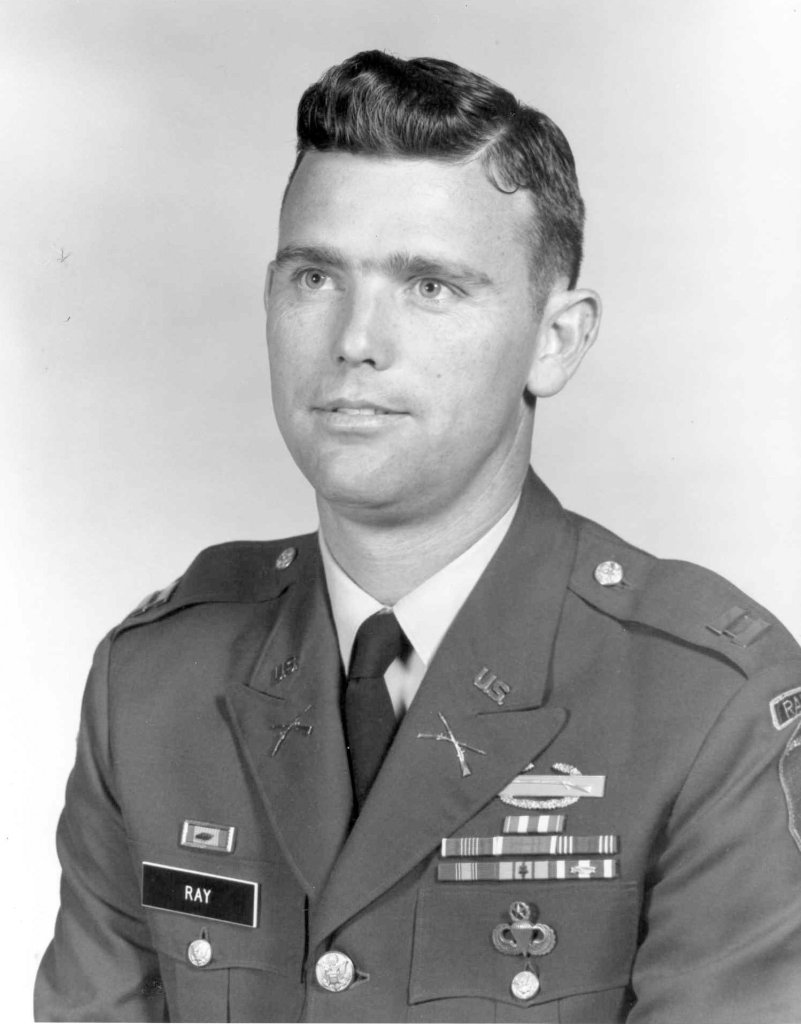Medal of Honor: Ronald E. Ray – Vietnam War, June 19, 1966
Deep in the unforgiving terrain of Vietnam’s Ia Drang Valley, First Lieutenant Ronald E. Ray fought not for ground—but for the lives of his men. The jungle was thick, the terrain brutal, and the enemy well-entrenched.
June 18, 2025

 Ronald Eric Ray
Ronald Eric Ray
Captain (then First Lieutenant), U.S. Army
Conflict: Vietnam War
Unit: Company A, 2nd Battalion, 35th Infantry Regiment, 25th Infantry Division
Date of Action: June 19, 1966
Location: Ia Drang Valley, Republic of Vietnam
Summary of Action:
Deep in the unforgiving terrain of Vietnam’s Ia Drang Valley, First Lieutenant Ronald E. Ray fought not for ground—but for the lives of his men. The jungle was thick, the terrain brutal, and the enemy well-entrenched.
On June 19, 1966, when one of his ambush patrols was pinned down by a Viet Cong force of company strength, Ray didn’t hesitate. He organized a reaction force and pushed through two kilometers of mountainous jungle under the weight of urgency. Breaking through enemy lines, he reached the patrol under fire and immediately took command of the chaotic battlefield.
When three of his men were pinned by automatic weapons fire, Ray charged forward, hurling a grenade and cutting down four Viet Cong with rifle fire. Moments later, he saw medics moving a casualty into cover—only to be trapped again by enemy fire. Ray advanced on the position and silenced it with another grenade.
Then came the split-second moment that would define his legacy.
An enemy grenade landed near two of his soldiers—unseen, unnoticed. Ray saw it. Without thought for himself, he dove onto it, shielding them from the blast. The explosion shredded his legs and feet. Still conscious, still bleeding, he heard the rattle of a machine gun and—through the pain—crawled into throwing distance. One last grenade, one last charge. The gun fell silent.
Refusing evacuation, Ray continued to direct his platoon. His men were outnumbered, nearly overrun. His leadership, even while wounded, kept them alive. Only after confirming his platoon had escaped the encirclement did he allow himself to be carried to safety.
Ronald Ray didn’t just fight through the enemy—he shielded his soldiers with his own body. In that jungle, one man’s courage stood between life and death. And he chose to stand.

Medal of Honor Citation:
*"For conspicuous gallantry and intrepidity in action at the risk of his life above and beyond the call of duty. Capt. Ray distinguished himself while serving as a platoon leader with Company A. When one of his ambush patrols was attacked by an estimated reinforced Viet Cong company, Capt. Ray organized a reaction force and quickly moved through 2 kilometers of mountainous jungle terrain to the contact area.
After breaking through the hostile lines to reach the beleaguered patrol, Capt. Ray began directing the reinforcement of the site. When an enemy position pinned down three of his men with a heavy volume of automatic weapons fire, he silenced the emplacement with a grenade and killed four Viet Cong with his rifle fire.
As medics were moving a casualty toward a sheltered position, they began receiving intense hostile fire. While directing suppressive fire on the enemy position, Capt. Ray moved close enough to silence the enemy with a grenade. A few moments later Capt. Ray saw an enemy grenade land, unnoticed, near two of his men. Without hesitation or regard for his safety, he dove between the grenade and the men, thus shielding them from the explosion while receiving wounds in his exposed feet and legs.
He immediately sustained additional wounds in his legs from an enemy machine gun, but nevertheless he silenced the emplacement with another grenade. Although suffering great pain from his wounds, Capt. Ray continued to direct his men, providing the outstanding courage and leadership they vitally needed, and prevented their annihilation by successfully leading them from their surrounded position.
Only after assuring that his platoon was no longer in immediate danger did he allow himself to be evacuated for medical treatment. By his gallantry at the risk of his life in the highest traditions of the military service, Capt. Ray has reflected great credit on himself, his unit, and the U.S. Army."*
